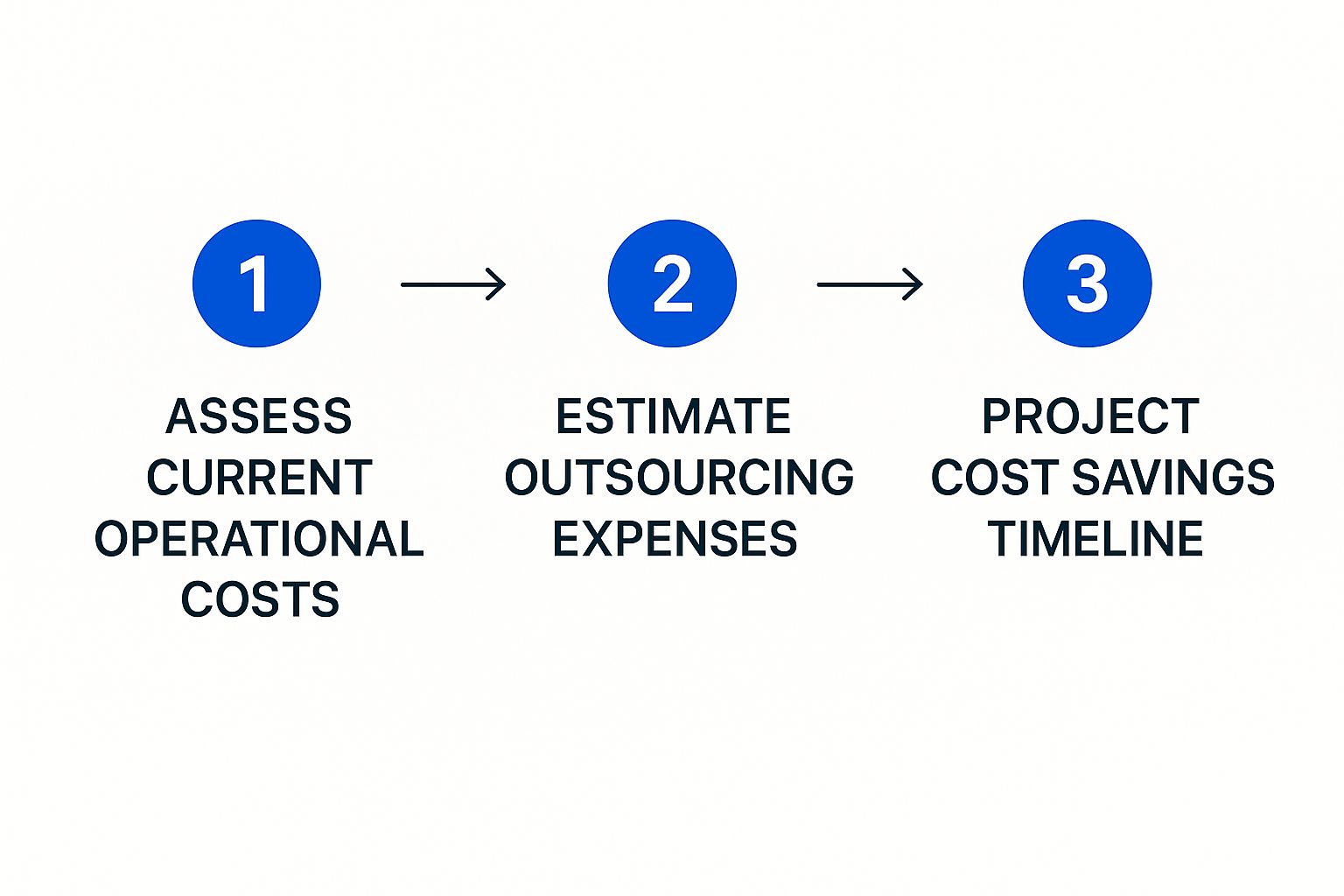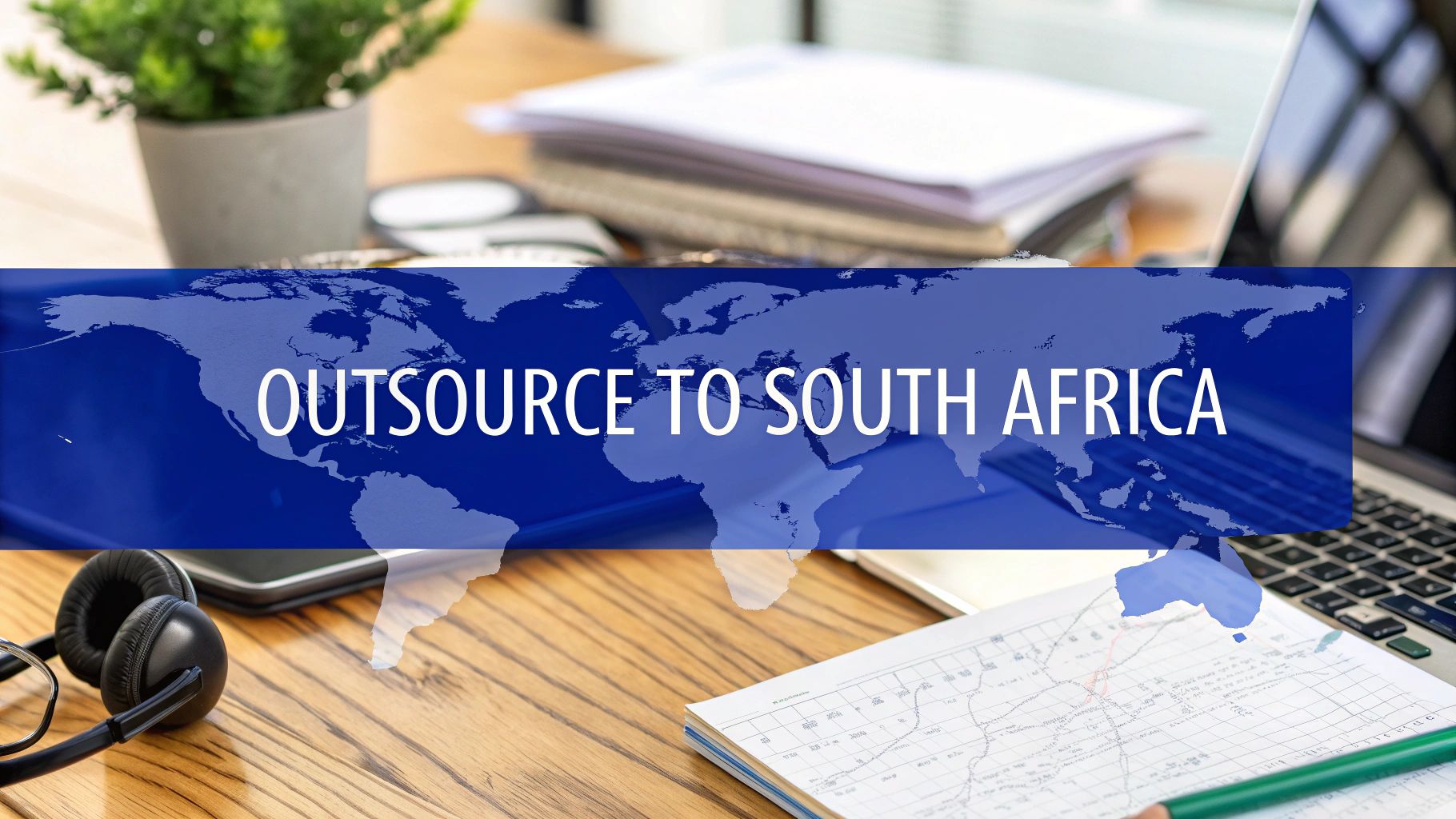Thinking about outsourcing to South Africa? You're not alone. A growing wave of UK businesses are realising this isn't just about shaving off a few costs. It's a strategic move that delivers a powerful mix of major financial savings, a highly skilled English-speaking workforce, and an operational rhythm that just clicks with UK working hours.
Why Smart UK Businesses Outsource to South Africa
For years, UK companies have looked abroad to scale up and get more efficient. While places like India and the Philippines have been popular, South Africa has quickly become a top contender, and for reasons that go well beyond the bottom line. The initial pull is almost always financial, but what keeps businesses there is the quality of the people and how smoothly they fit into your existing team.
This isn't about just offloading tasks you don't want to do. It’s about building a genuine, strategic extension of your company.
The impact on your operational budget can be dramatic. We're talking about a significant drop in labour costs without having to sacrifice skill or professionalism.
By tapping into the South African talent market, UK businesses can unlock a strategic advantage that goes beyond cost savings. It’s about building a resilient, scalable, and highly effective global team that feels local.
This financial breathing room is a game-changer. It allows you to pour those savings back into the core of your business—think product development, marketing campaigns, or technology upgrades. It fuels growth that might have previously felt out of reach.
The Financial and Talent Advantage
Let's talk numbers, because they really do speak for themselves. On average, salaries in South Africa are 50–60% lower than for the same roles here in the UK. That’s an immediate, tangible reduction in your overheads, all while maintaining the quality of work you expect. For any business looking to scale smartly, that’s a massive driver. If you'd like to dive deeper, you can discover more about the financial benefits of outsourcing to South Africa and how it strengthens collaboration.
But this isn't just a cost-cutting exercise. The savings are matched by an impressive pool of talent. South Africa boasts a strong education system and a workforce renowned for its work ethic. We've seen incredible expertise in several key areas:
- Customer Support: You get agents who are not only fluent in English but also culturally in sync with UK customers. This leads to far more natural and effective conversations.
- Finance and Accounting: It’s easy to find qualified bookkeepers, clerks, and financial analysts who are comfortable with international accounting standards.
- Creative and Digital Marketing: The country is a blossoming hub for talented content creators, savvy digital marketers, and top-tier administrative support professionals.
To give a clearer picture, here’s a quick breakdown of why South Africa is such a compelling option for UK firms.
Key Advantages of Outsourcing to South Africa for UK Firms
As you can see, the decision to outsource to South Africa is backed by strong, practical benefits that directly address common business challenges.
Seamless Operational Synergy
Beyond the talent and the savings, the day-to-day logistics are what truly seal the deal. South Africa's time zone is either the same as the UK's or just one to two hours ahead, depending on the season. This tiny difference is a huge operational advantage. It gets rid of the frustrating delays and communication gaps you often get when working with teams halfway across the world.
What does this mean in practice? Your South African team works when you work. Daily stand-ups, brainstorming sessions, and quick chats on Slack happen in real-time, without anyone having to get up in the middle of the night. It makes your outsourced staff feel like they’re just in another office, not on another continent.
This effortless integration is vital for keeping productivity high and maintaining a strong company culture, turning the choice to outsource to South Africa into a clear strategic win.
Defining What to Outsource for Maximum Impact

Before you even think about finding an outsourcing partner, the first, most critical step is to look inward. Deciding what to hand over is much more than just offloading tasks you don’t enjoy. It’s a strategic exercise in pinpointing operational headaches and freeing up your core team to do what they do best: drive growth and innovate.
A good place to start is by looking for friction. Where are the consistent pain points in your business? These are your prime candidates for outsourcing. This friction might be a persistent skills gap you can't seem to fill locally, sky-high salary demands for certain roles, or perhaps a position that suffers from frustratingly high staff turnover.
Identifying Your Outsourcing Sweet Spots
Think about the functions that keep your business running smoothly but aren’t part of your core value proposition. For most companies, these are the repeatable, process-driven tasks that can be clearly documented and measured. When you outsource to South Africa, these are the areas where you'll see the biggest and fastest returns.
Let’s look at a few real-world examples:
- The Overwhelmed Support Desk: A UK fintech start-up is scaling rapidly, but its small customer support team is drowning. They need skilled agents who can handle complex financial queries without the massive overhead of expanding their London office.
- The Content Creation Bottleneck: A digital marketing agency needs to pump out more high-quality content to stay competitive. The problem? Finding affordable writers and social media managers on home soil is a constant struggle.
- The Admin Drain: An accounting firm finds its partners are spending far too much time on routine bookkeeping and payroll. This is time that should be spent on high-value client advisory work.
Each of these scenarios highlights a function that is perfectly suited for a strategic outsourcing solution.
The goal here isn't just delegation. It's about building a dedicated, external team that solves a specific business problem, empowering your in-house experts to focus on what truly generates revenue.
Setting the Stage for Success
Once you've got a shortlist of roles to outsource, your next job is to create a detailed blueprint for what this new team will do. This means documenting everything.
Create crystal-clear Standard Operating Procedures (SOPs) for every task you plan to delegate. The more detailed your instructions, the quicker your new team will get up to speed and start delivering real value.
This prep work is also the perfect time to define what success actually looks like. Don't wait until you've hired someone to start thinking about metrics. Set meaningful Key Performance Indicators (KPIs) from the very beginning.
For a customer support role, you might want to track:
- First Response Time (FRT)
- Customer Satisfaction (CSAT) scores
- Ticket Resolution Rate
For a digital marketing role, you could measure:
- Number of qualified leads generated
- Content engagement rates
- Growth in social media following
By having all this defined before you even approach a provider like Beyond Hire, you build a rock-solid foundation. It ensures that when you do outsource to South Africa, you aren't just hiring individuals—you're seamlessly integrating a purpose-built extension of your team, ready to make an impact from day one.
Finding the Right South African Outsourcing Partner

Once you’ve mapped out which parts of your business you’re ready to hand over, you’re face-to-face with the most critical decision of all: choosing your partner. Getting this right will make or break your experience when you outsource to South Africa. The market is full of options, but finding the perfect fit demands a solid strategy and a keen eye for what truly matters.
Your first fork in the road is deciding whether to hire people directly or partner with a managed outsourcing provider. Going direct gives you complete control, but it also means you’re on the hook for recruitment, legal compliance, and HR management in a country you’re not familiar with. For most UK businesses, it’s a path loaded with complexity and hidden costs.
This is where a managed provider like Beyond Hire comes in. Think of them as your team on the ground. They take care of the sourcing, vetting, and all the administrative headaches, freeing you up to focus on what you do best: integrating your new team members and driving performance. It’s a much safer, more streamlined approach.
Vetting Potential Partners
When you start talking to potential partners, you have to dig deeper than their glossy brochures and slick sales pitches. Your mission is to truly understand how they operate, what they stand for, and what their track record looks like. A key giveaway of their quality is how they find and, more importantly, keep their talent.
Don't hesitate to ask detailed questions about their operational model. Any partner worth their salt will be completely transparent about their processes and genuinely keen to show you the value they bring.
Here are a few essential areas I always recommend digging into:
- Talent Sourcing and Vetting: Where do they find their candidates? What does their screening process actually involve beyond a quick CV scan? You’re looking for a partner who runs comprehensive interviews and proper technical assessments.
- Cultural Integration: How do they make sure a new hire will actually fit in with your company’s unique culture? A partner who gets this understands that a successful hire is about more than just a list of skills.
- Performance Management: What systems do they use to support the talent they place with you? And just as importantly, how do they deal with underperformance if it crops up?
A great outsourcing partner doesn’t just fill a vacancy. They invest real time in understanding your business, ensuring every candidate they put forward is a potential long-term asset, not just a short-term fix.
The Critical Compliance Checklist
Let's be clear: security and compliance are completely non-negotiable. Your South African partner will be handling your sensitive company and customer data, so you need total confidence in their security measures. The UK’s Business Process Outsourcing (BPO) market is on track to hit around USD 31.46 billion by 2025, a growth fuelled by the demand for secure, efficient services. South African firms are perfectly positioned to meet this demand, but you have to do your homework and verify their credentials. You can read more about the UK's BPO market trends on invensis.net.
Before you even think about signing a contract, make sure you have concrete answers to these compliance questions:
- Data Security: How do they handle compliance with both GDPR and South Africa’s own POPIA (Protection of Personal Information Act)?
- Service Level Agreements (SLAs): Are their SLAs crystal clear, measurable, and built around your specific needs? What happens if they don't hit the targets they've agreed to?
- Communication Protocols: What are the official channels for communication? How often will you connect? Critically, how do they manage escalations or emergencies?
Choosing your partner with care is what lays the foundation for a successful, transparent, and lasting relationship. It’s the difference between merely offloading tasks and building a true strategic extension of your UK team.
Weaving Your UK and South African Teams Together

So, you’ve hired your talent in South Africa. The real work starts now: making them feel like a genuine part of your company, not just a satellite office on another continent. A welcome email and a login aren’t enough. True integration is about deliberately weaving a single, cohesive culture that makes the miles between you disappear.
When you outsource to South Africa, you're not just finding remote help; you're building an extension of your business. Treat it that way.
The fantastic thing about working with South Africa from the UK is the minimal time difference. We're talking a one or two-hour gap, which is a game-changer for collaboration. This isn't just about scheduling meetings easily; it's your golden opportunity to build real relationships and foster a truly shared purpose in real time.
Creating One Team, Not Two
Your aim should be simple: make someone working from Cape Town feel just as integral as the person sitting in your London office. You have to actively fight the "us vs. them" mindset that can so easily poison distributed teams.
One of the most effective things I've seen work is creating dedicated digital spaces for everything. Think about it like building a virtual office:
- Project Hubs: Use tools like Slack or Microsoft Teams to create channels for specific projects. This keeps conversations focused and ensures everyone, UK or SA, is on the same page.
- The Virtual Canteen: Set up channels for non-work chat. A place for pet photos, weekend plans, and random banter. This is where the magic happens and where colleagues become friends.
- Company Town Square: All major company news—the big wins, the strategy shifts, the team updates—should be shared with everyone at the exact same time. It sends a powerful message: we are all in this together.
These channels are your best bet for recreating the organic, spontaneous chats that build real team spirit in a physical office.
The moment your team stops thinking about where everyone is and just sees colleagues working towards the same goal—that's when you've nailed it. It’s about building a culture where every single person feels seen, heard, and vital to your success.
Forging Real Human Connections
Strong relationships are the foundation of any high-performing team, and that's even more true when you're working remotely.
Virtual get-togethers are a fantastic tool. Think about holding regular virtual town halls where leadership doesn't just talk at the team but opens the floor for genuine questions from everyone, no matter their location.
A simple but brilliant tactic is the "buddy system." Pair up a new starter in South Africa with a seasoned team member in the UK. This gives the new person an informal, go-to contact for all those small questions they might feel silly asking in a group channel. It’s an accelerator for cultural onboarding.
Of course, your managers need the right toolkit for this new way of working. For more on that, our guide on managing remote teams is packed with practical tips. Making your South African team feel genuinely part of the company is what elevates a good outsourcing move into a brilliant long-term strategy.
Onboarding and Managing Your Remote Team
Finding the right talent in South Africa is a massive win, but the real work starts once they've signed the contract. How you bring them into the fold and manage them day-to-day will ultimately decide whether your outsourcing venture succeeds or fails. A solid onboarding process is the bedrock of their long-term success and your return on investment.
This isn't just about handing over logins and doing a quick round of introductions. It's about properly immersing your new team members in your company's culture. They need deep training on your mission, your specific brand voice, and the workflows they’ll be responsible for. Think of it as a cultural deep-dive, not just a technical handover. When you set crystal-clear expectations right from the start, you eliminate guesswork and empower your team to hit the ground running with confidence.
Setting the Stage for High Performance
Those first few weeks are absolutely crucial. This is your opportunity to set a precedent for continuous feedback and open communication. Don't fall into the trap of waiting for a quarterly review to discuss how things are going. Instead, create an environment where regular, constructive chats are just part of the normal routine.
A well-thought-out onboarding plan is your best friend here, ensuring every new hire gets the same high-quality introduction to your business. To help you cover all your bases, we've put together a comprehensive onboarding checklist for new employees that walks you through the process step-by-step. Getting this right ensures your South African team feels valued and supported from day one, which means they’ll start contributing in a meaningful way much faster.
The goal here isn’t just to get your new hires up and running. It's to make them feel like a genuine, indispensable part of one cohesive team. A great onboarding experience closes the geographical distance and turns a remote contractor into a true brand champion.
After a successful onboarding, your focus shifts to effective ongoing management. This is where you connect back to the KPIs you set earlier. It’s all about tracking performance transparently. This isn't micromanagement; it's about having data-driven conversations that highlight areas for improvement and, just as importantly, celebrate their successes.
To help you structure this critical phase, here is a practical checklist you can adapt for your own process.
Onboarding Checklist for Remote Teams
This framework ensures nothing falls through the cracks, making your new South African team members feel fully integrated and ready to perform.
Sustaining Momentum and Growth
Meaningful one-on-one meetings are the lifeblood of great remote management. These need to be a two-way conversation—a dedicated time for you to give feedback, but also for them to raise challenges, ask questions, and feel genuinely heard.
Don't forget about their professional growth, either. Offering access to new training courses or certifications shows you're invested in their career. It’s a powerful way to build loyalty and boost performance over the long haul.

As you can see, your management approach directly impacts your bottom line. It's all connected—from onboarding to ongoing development and, ultimately, your return on investment.
At the end of the day, your management style has to be proactive. More and more UK companies are turning to South Africa's BPO sector to fill critical talent gaps, especially in tech and customer service. By tapping into this educated, English-speaking workforce, UK firms are finding a direct solution to their hiring shortages. Making sure your new team has everything they need to succeed isn't just good management—it's a strategic necessity.
Common Questions About Outsourcing to South Africa
Making the leap to outsource to South Africa is a big decision, and it’s natural to have a few questions swirling around. I’ve seen business leaders grapple with the same concerns time and again—things like legal frameworks, data security, and whether the cultural fit will be right. Let's tackle these head-on so you can move forward with total confidence.
Even when the benefits are clear as day, a little hesitation is normal. Getting these common questions answered is the best way to build your outsourcing plan on a rock-solid foundation of trust and clarity.
How Does South Africa Handle Data Protection?
This is usually the first question that comes up, and rightly so. Protecting your company and client data is absolutely paramount. The good news is that South Africa has its own comprehensive data privacy law, the Protection of Personal Information Act (POPIA). It’s remarkably similar in principle and scope to the UK's GDPR.
This alignment is a massive plus. It means any credible South African outsourcing partner is already working under strict data protection regulations. When you’re vetting potential partners, make sure you ask them directly about their POPIA and GDPR compliance.
They should be able to show you clear documentation covering:
- Their protocols for handling and storing data.
- Security credentials, such as ISO 27001 certification.
- A well-defined plan for responding to a data breach.
This shared commitment to data privacy makes the whole process smoother and much more secure.
A partner’s fluency in both POPIA and GDPR isn’t just a bonus; it’s a clear indicator of their professionalism and readiness to work with UK businesses. It signals they take security as seriously as you do.
Is There a Big Cultural Difference to Manage?
One of the standout advantages of partnering with South Africa is the strong cultural affinity with the UK. From a shared business etiquette and a similar sense of humour to a direct and professional communication style, collaboration just feels natural from the get-go. This really cuts down on the kind of friction and miscommunication that can sometimes happen with teams in other parts of the world.
Of course, no two cultures are identical, but you’ll find the similarities are far greater than the differences. Your South African team will intuitively grasp UK customer expectations and fit right into your company culture. Just like with any new hire, a solid onboarding process is the key to success. You can explore some effective remote hiring strategies to help build a cohesive, unified team from day one.
This cultural closeness is a huge reason why UK companies find it so easy to build genuine, productive relationships when they outsource to South Africa. It’s about more than just speaking the same language; it's a shared understanding of how to work together well.

